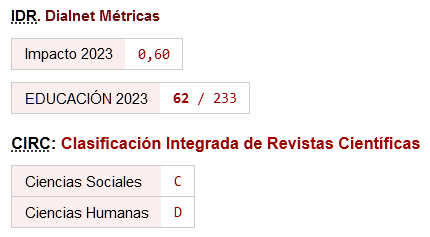Development of empathy and ethical values through role-playing games as innovation for education in values
DOI:
https://doi.org/10.46661/ijeri.7273Keywords:
Role-playing games, Empathy, Ethical values, LearningAbstract
For some authors, the development of empathy is a central aspect of the development of ethical values. Role-playing games can be the ideal vehicle to transfer learning from fiction to reality. The present study analyzes in an exploratory and descriptive way the scores obtained in the Test of Cognitive and Affective Empathy (TECA) of a total sample of 208 participants. Although no major differences were found between those who had previously participated in role-playing games and those who had not, there was a tendency to obtain higher mean scores than those obtained by the TECA through its scales.
Downloads
References
Abbott, M. S., Stauss, K. A. & Burnett, A. F. (2021). Table-top role-playing games as a therapeutic intervention with adults to increase social connection. Social Work with Groups, 45(1), 16-31. https://doi.org/10.1080/01609513.2021.1932014
Afonso, S. & Aguilera, L. (2021). Desigualdades en el mundo de los videojuegos desde la perspectiva de los jugadores y las jugadoras. Investigaciones feministas, 12(2), 677-689. https://doi.org/10.5209/infe.60947
Altuna, B. (2018). Empatía y moralidad: las dimensiones psicológicas y filosóficas de una relación compleja. Revista de Filosofía, 43(2), 245-262. https://doi.org/10.5209/RESF.62029
Amador, J. A. & Forns, M. (2019). La escala de inteligencia de Wechsler para niños, quinta edición: WISC-V. Documento de trabajo. https://bit.ly/3xhM9vI
Arán, V., López, M. & Richaud, M.C. (2021). Aproximación neuropsicológica al constructo de empatía: aspectos cognitivos y neuroanatómicos. Cuadernos de Neuropsicología / Panamerican Journal of Neuropsychology, 6(1), 63-83. https://www.redalyc.org/pdf/4396/439643203006.pdf
Ávila, A. & Tomé, M. C. (1989). Evaluación de la deseabilidad social y correlatos defensivos emocionales. Adaptación castellana de la Escala de Crowne y Marlowe. En A. Echevarría y D. Páez (Eds.), Emociones: perspectivas psicosociales (505-514). Fundamentos.
Bahr, A. (2018). Tiny Dungeon. Akuma Studio.
Barbosa, A. & Trindade, J. D. (2020). Reflexões acerca do roleplaying game (RPG) na educação: potencialidade cognitiva. Revista Multidebates, 4(2), 114-124. http://revista.faculdadeitop.edu.br/index.php/revista/article/view/244
Baron-Cohen, S. & Wheelwright, S. (2004). The empathy Quotient: An investigation of adults with Asperger syndrome or high functioning autism, and normal sex differences. Journal of Autism and Developmental Disorders, 34, 163-175. https://link.springer.com/article/10.1023/B:JADD.0000022607.19833.00
Brell, M. (2006). Juegos de rol. Educación social: Revista de intervención socioeducativa, 33, 104-113. https://bit.ly/3oss9Rc
Bryant, B. K. (1982). An index of empathy for children and adolescents. Child development, 53, 413-425. https://doi.org/10.2307/1128984
Chandran, S., Sreedaran, P., Pradeep, J., Manohari, S. M., Kuppili, P. P. & Kishor, M. (2020). Using entertainment media to teach undergraduate psychiatry: Perspectives on the need and models of innovation. Arch Med Health Sci, 8(1), 125-132. https://www.amhsjournal.org/text.asp?2020/8/1/125/287367
https://doi.org/10.4103/amhs.amhs_57_20
Da Silva, R. L. (2020). Designing a Digital Roleplaying Game to foster awareness of hidden disabilities. International Journal of Designs for Learning, 11(2), 55-63. https://doi.org/10.14434/ijdl.v11i2.27257
Fernández-Seara, J. L. & Mielgo, M. (2017). Escalas de Apreciación del Estrés. TEA ediciones.
Ferrando, P. J. & Chico, E. (2000). Adaptación y análisis psicométrico de la escala de deseabilidad social de Marlowe y Crowne. Psicothema, 12, 383-389. https://www.redalyc.org/pdf/727/72712309.pdf
García, A. (2017). Privilege, Power and Dungeons & Dragons: How systems shape racial and gender identities in tabletop role-playing games. Mind, Culture and Activity, 24(3), 232-246. https://doi.org/10.1080/10749039.2017.1293691
García-Fernández, J., Fernández-Gavira, J., Sánchez-Oliver, A. J., & Grimaldi-Puyana, M. (2017). Gamificación y aplicaciones móviles para emprender: una propuesta educativa en la enseñanza superior. International Journal of Educational Research and Innovation (IJERI), 8, 248-259. https://www.upo.es/revistas/index.php/IJERI/article/view/2434
Gil, P., Sánchez, C. & Conill, P. J. (2019). Peacemaker. Nosolorol.
Gutiérrez, S., Sanz, J., Espinosa, R., Gesteira, C. & García-Vera, M. P. (2016). La escala de Deseabilidad Social de Marlowe-Crowne: baremos para la población general española y desarrollo de una versión breve. Anales de psicología, 32(1), 206-217. https://dx.doi.org/10.6018/analesps.32.1.185471
Hauser, M. (2008). La mente moral. Paidós.
Hite, K. (2018). Vampiro: la mascarada (5 ed.). Nosolorol.
Hoffman, M. L. (1982). The measurement of empathy. En Izard C.E., Measuring Emotions in Infants and Children (pp. 279-296). Cambridge University Press.
Kerem, E., Fishman, N. & Josselson, R. (2001). The experience of Empathy in everyday relationships: cognitive and affective elements. Journal of social and personal relationships, 18(5), 709-729. https://doi.org/10.1177/0265407501185008
Lazarus, R. S. & Folkman, S. (1986). Estrés y procesos cognitivos. Martínez Roca
López-León, R. & Gómez-Valdez, G. (2018). Entendiendo la empatía en la educación del diseño. International Journal of Educational Research and Innovation (IJERI), 10, 51-63. https://www.upo.es/revistas/index.php/IJERI/article/download/3456/2742/0
López-Pérez, B., Fernández-Pinto, I. & Abad, F. J. (2008). Test de Empatía Cognitiva y Afectiva (TECA). TEA ediciones.
Miranda de la Lama, M. H. & Daturi, D. E. (2021). La empatía y su trascendencia en la educación. La colmena, 112, 51-62. https://doi.org/10.36677/lacolmena.v0i112.15772.
Moos, R. H. (2010). CRI-A. Inventario de Respuestas de Afrontamiento. TEA ediciones.
Nunnally, J. C. (1978). Psychometric Theory. McGraw Hill.
Ostertagová, E., Ostertag, O. & Kovác, J. (2014). Methodology and Application of the Kruskal-Wallis Test. Applied Mechanics and Materials, 611, 115-120. https://doi.org/10.4028/www.scientific.net/AMM.611.115
Pamundi, C. & Piñol, C. (2020). Fanhunter. Devir.
Patsaki, E. & Reyes, F. (2016). Magissa, rol para niños. Nosolorol.
Prinz, J. (2011a). Is empathy necessary for morality?, en Coplan, A. y Goldie, P. (eds.), Empathy: Philosophical and Psychological Perspectives. Oxford University Press. https://doi.org/10.1093/acprof:oso/9780199539956.003.0014
Prinz, J. (2011b). Against empathy. Southern Journal of Philosophy, 49(1), 214-233. https://doi.org/10.1111/j.2041-6962.2011.00069.x
Rifkin, J. (2010). La civilización empática: la carrera hacia una conciencia global en un mundo en crisis. Paidós.
Rubio, M. & Cabañes, E. (2012). El sexo de los píxeles. Del yo-mujer al yo-tecnológico. Revista de Estudios de Juventud, 98, 150-166. https://www.injuve.es/sites/default/files/Revista98_11.pdf
Sánchez, V., Álvarez-Ossorio, A. & Álvarez, A. (2022). Iberia: Un juego de rol para una didáctica de la historia antigua significativa e innovadora. El futuro del pasado, 13, 641-669. https://doi.org/10.14201/fdp.27394.
Sesenra, S. [Sirio Sesenra] (14 de noviembre de 2019). El dilema del bebé orco [Video]. Youtube. https://youtu.be/0A3Yw4qle1o
Slote, M. (2007). Moral sentimentalism. Oxford University Press.
Storm, S. & Jones, K. (2021). Queering critical literacies: disidentifications and queer futurity in an afterschool storytelling and roleplaying game. English teaching: Practice & Critique, 20(4), 534-548. https://doi.org/10.1108/ETPC-10-2020-0131
Williams, J. P., Kirschner, D., Mizer, N. & Deterding, S. (2018). Sociology and Role-Playing Games. Routledge. https://doi.org/10.4324/9781315637532-12
Published
How to Cite
Issue
Section
License
Copyright (c) 2023 Jose David Carnicero Pérez, Ricardo Moreno-Rodríguez, Nerea Felgueras Custodio

This work is licensed under a Creative Commons Attribution-NonCommercial-NoDerivatives 4.0 International License.











